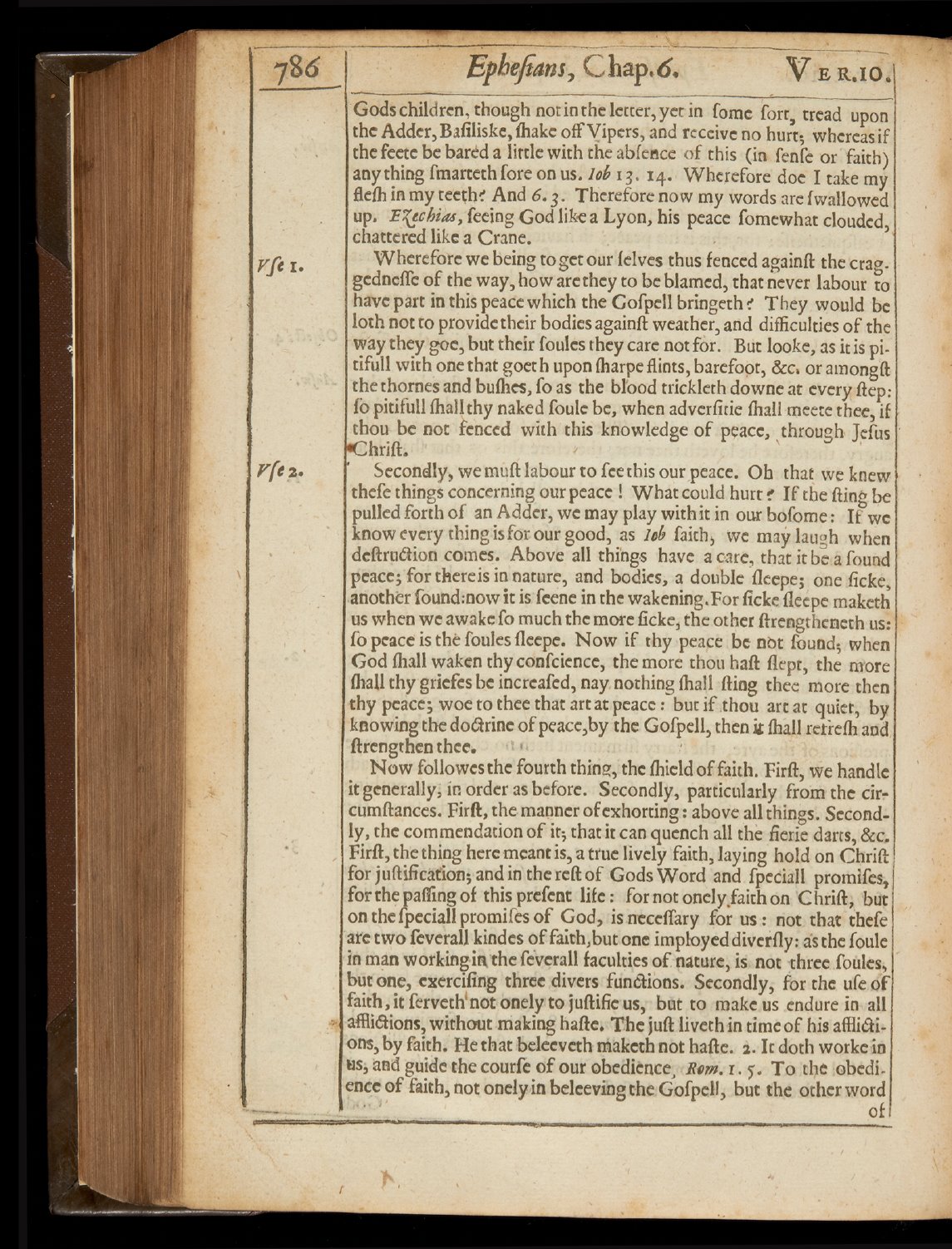

Yfe
2.
Epheiana,
Ghap.6.
V
ER.IO,
Godschildren. though not
in
the letter, yet
in
fome
fort,
tread
upon
the Adder,Bafiliske,
(hake
offVipers,
and receive no
hurt;
whereas
if
the
feete
be bared
a
little with the
ab(ence
of
this (in
fence
or faith)
anything fmarteth fore on us.
¡od
13.
14. Wherefore
doe
I
take my
flefh in
my
teeth!
And
6.3.
Therefore now
my words
arc
(wallowed
up.
P7techias, feeing
God
like
a
Lyon,
his peace
fomewhat
clouded,
chattered
like
a
Crane.
Wherefore
we being to get
our (elves thus fenced againft the crag.
gedneffe
of
the way, how
are
they to be blamed,
that
never labour to
have
part
in
this peace
which the Gofpell bringeth
c
They
would
be
loth not to
providetheir bodies
againft
weather, and
difficulties
of
the
way
they goe, but their
foules
they
care
not for.
But looke,
as it is pi-
tifull
with
one
that goeth
upon
(
harpe
flints,
barefoot,
&c,
or among
ft
the thornes
and bufhes, fo
as
the
blood trickleth downe at every
ftep:
fo pitifull fhall
thy
naked foule be,
when
adverficie fhall meete
thee,
if
thou be not
fenced
with
this knowledge
of
peace,
through
Jefus
hrift.
Secondly, we
muff
labour
to
fee
this our peace.
Ob that
we knew
thefe
things concerning our
peace
!
What
could
hurt
e
If
the
fling
be
pulled
forth
of
an
Adder,
we may play with
it in
our
bofome:
If
we
know every thing
is
for
our good,
as lob
faith) we
may laugh when
deffraëtion comes.
Above
all
things
have
a
care,
that
it
be
a
found
peace;
for thereis
in
nature,
and
bodies,
a
double fleepe;
one ficke,
another
found:now
it
is feene in
the wakening.For
ficke fleepe
maketh
us
when we
awake fo much
the more
ficke,
the other ftrengtheneth
us:
fo peace
is
the
foules fleepe.
Now if
thy
peace
be not
found; when
God
fhall
waken
thy
confcience,
the
more thou haft flept,
the more
(hall
thy
griefes be increafed, nay nothing
fhall
fling
thee more then
thy
peace; woe to thee
that art
at peace
:
but
if
thou
art at
quiet, by
knowing
the
doEtrine
of
peace,by the Gofpell, then it
(hall
rerrefh and
ftrengthenthee.
Now
followcs
the fourth thing,
the
fhield
of
faith. Firft, we handle
it generally,
in
order
as
before. Secondly, particularly from
the
cir-
cum(tances.
Firft,
the
manner
of exhorting:
above
all
things. Second-
ly, the commendation
of
it;
that
it
can
quench
all
the
fierie
darts, &c.
Finit,
the
thing here meant is,
a
true lively faith, laying
hold
on
Chrift
for
juftifcation;
and
in
the
refs
of
Gods
Word
and fpeciall
promifes,
forthe
pairing
of this prefent
life
:
for not
onely_faith
on
C
hrift, but
on the fpeciall promifes
of
God,
is
neceffary
for
us
:
not
that
thefe
arc
two
feverall kindes
of
faith,but
one imployed
divert,:
as
the foule
in
man working in
the
feverall faculties
of
nature,
is
not three
foules,
but one,
exercifing three divers functions. Secondly, for the
ufe
of
faith,
it
ferveth'not
onely
to
juftifie
us,
but to
make
us
endure in all
affliétions,
without
making hafte.
The
juft
liveth
in
time
of
his
afIliQi-
ons,
by
faith.
He
that
beleeveth maketh not hafte.
2.
Ir doth worke
in
us,
and
guide
the
courfe
of
our
obedience,
Rom.
r.
S.
To
the obedi.
ence
of
faith, not onely in beleeving
the Gofpell, but the other
word
of

















